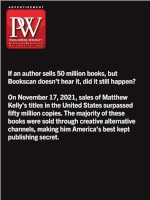In A Fine Madness (Pegasus Crime, Feb.), Judd recreates the intrigue surrounding the life and death of Elizabethan playwright Christopher Marlowe.
What makes your portrayal different from other books fictionalizing Marlowe’s life?
It was reassuring that others had also found Marlowe interesting enough to write about, comforting that my interest wasn’t too eccentric. I chose to dramatize his life from an outside perspective and through his probable espionage connection. Also, I wanted to show his death not as a conspiracy, for which there’s no evidence—although many find the idea attractive—nor as literally self-sought, but as the inevitable outcome of a nihilistic spiritual condition, a self-destructive tendency.
Is the truth about Marlowe’s death knowable?
All we know about it is what we read in the coroner’s report unearthed by the American historian Leslie Hotson in 1925. Although many are attracted by conspiracy theories, there’s no evidence that it’s false or misleading. However, we can be pretty sure that it’s not the whole story. We don’t know why Marlowe and the three others, one of whom was his killer, were meeting that day. We do know that all three of the others present had associations with Sir Francis Walsingham’s spy network. In the absence of further documentary discovery such as Hotson’s, the full story remains a matter of surmise and to that extent is unknowable.
Why have real-life spy Thomas Phelippes narrate?
The advantages of Phelippes as narrator, is, firstly, that he existed. What we know of his activities as Walsingham’s right-hand man and one-man Bletchley Park makes him of interest in himself. Secondly, because of those activities, he can give us a perspective on Marlowe which isn’t the usual theater-based one. Thirdly, he can show us a Marlowe who remains essentially unknowable. “A cat that walks alone,” as I have Phelippes describe him.
What do people today get wrong about Walsingham?
The idea that he was no more than a narrow, intense, Protestant, anti-Catholic obsessive. Although he had elements of those characteristics, he was as keen to persecute Puritan or Protestant extremists as he was Catholic priests who worked secretly to overthrow the queen and roll back the Reformation. Often overlooked are his patronage of the arts, his modesty, and that he largely self-financed his espionage network, amassing heavy debts.



 Volume 268
Issue 51
12/13/2021
Volume 268
Issue 51
12/13/2021





